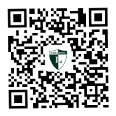2019-2021 Domestic digital experiment teaching and research literature review (2021 special feature of the 14th National digital experiment high level Forum)
Original 2021-11-26 14:50:00In October 2021, Shanghai DIS R&D Center adopted the method of literature research and content analysis, with the help of CNKI, Wanfang, FreeCheck and other websites, and conducted a search on the domestic primary and secondary school experimental teaching literature (Hong Kong, Macao and Taiwan not counted) from January 1, 2019 to September 30, 2021 with the keywords of "Digital Experiment" and "DIS", and obtained a total of 422 teaching and research papers related to digital experiment. A brief summary is as follows.
No.1 Academic stages distribution of digital experimental teaching and research literature
The number distribution law of digital experimental teaching and research literature in different academic stages is: high school is more than middle school, middle school is more than primary school. The number of teaching and research literatures is directly related to the popularity of digital experiments in the three academic stages.
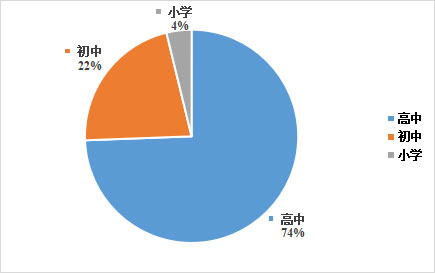
Figure 1 Academic stages distribution of digital experimental teaching and research literatujres from 2019 to 2021
No.2 Discipline distribution of digital experimental teaching and research literatures
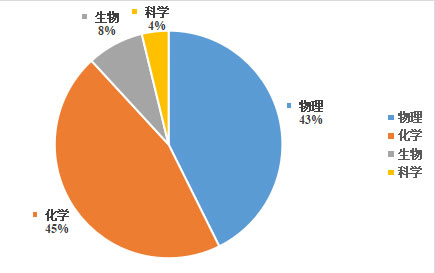
Figure 2 Discipline distribution of digital experimental teaching and research literature from 2019 to 2021
According to the discipline distribution of literatures, physics and chemistry are equal, and chemistry is slightly more than physics. Biology is significantly less than physics and chemistry, and primary school science is only half of biology. It shows that there are significant disciplinary differences in the implementation of digital experiments.
No.3 distribution of authors of digital experimental teaching and research literatures
3.1 geographical distribution of literature authors
The researchers ranked the occurrence frequency of the provinces, cities and autonomous regions to which the authors belong. The preliminary results show that digital experimental literature has been contributed in 29 provinces and autonomous regions except Tibet, but the geographical distribution is very uneven. Jiangsu Province ranks first in the country in the contribution of digital experimental teaching and research literature in most school stages and disciplines, and is far ahead of other provinces in the contribution of digital experimental literature in middle school chemistry together with Anhui Province. Shanghai takes the lead in the contribution of primary school science digital experiment teaching and research literature, and ranks first with Fujian in the contribution of high school physics digital experiment teaching and research literatures. In terms of the overall number of literatures, Jiangsu, Anhui, Shanghai, Fujian and Guangdong provinces and cities rank among the top five in China. Obviously, the teaching and research work of teachers in Jiangsu Province, Shanghai and Anhui Province is more worthy of national learning and reference.
Table 3-1 Ranking of regions with 10 or more authors of digital experimental teaching and research literatures from 2019 to 2021
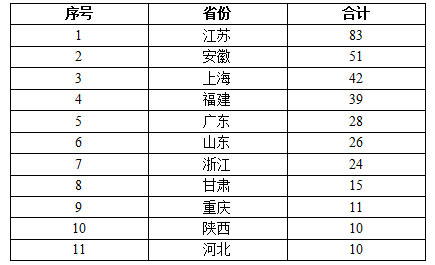
3.2 Distribution of schools and institutions of literature authors
Researchers ranked the occurrence frequency of the working schools and institutions where the authors of the literatures belong, and found many schools that have made outstanding contributions to the teaching and research of digital experiments.
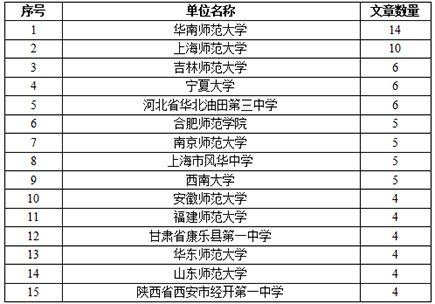
Table 3-2 Ranking of school and institutions publishing 4 or more digital experimental teaching and research literatures from 2019 to 2021
No.4 Publication distribution of digital experimental literatures
The author sorts out the publications that publish digital teaching and research literatures according to the number of publications.
Table 4 Ranking of publications with more than 10 digital experimental teaching and research literatures published from 2019 to 2021
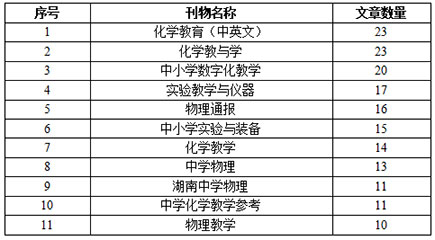
No.5 Sensors involved in digital experimental literature
Sensors are the basic equipment of digital experiment. According to the frequency of various sensors in the digital experiment literatures, the researchers made a statistical ranking, and obtained the use frequency of different kinds of sensors in the digital experiment of various disciplines. According to the research results, the education equipment department can study and formulate more reasonable digital experiment equipment standards.
Table 5 Ranking of various sensors that appear more than 10 times in the digital experimental teaching and research literatures from 2019 to 2021
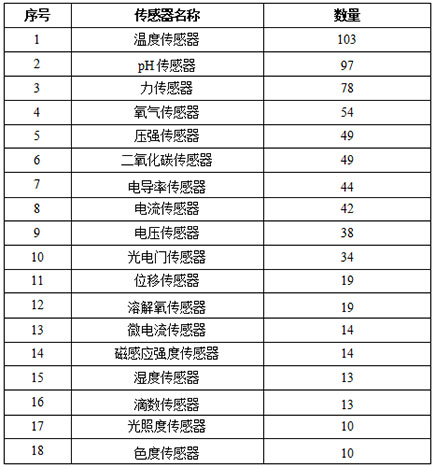
No.6 Research content analysis of digital experimental literatures
6.1 Research direction dimension
Table 6-1 Composition of digital experimental teaching and research literature by discipline from 2019 to 2021
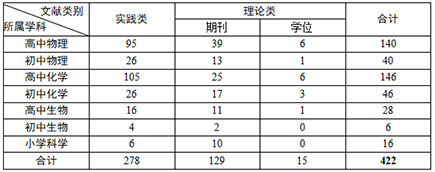
It can be seen from the above table that the practical literature of most academic stages and disciplines is more than the theoretical literature. Only in the primary school scientific digital experiment literature, the theoretical literature is significantly more than the practical literature.
6.2 Title keyword dimension
Table 6-2 high frequency keywords in title of digital experimental literatures from 2019 to 2021

It can be seen from the above table that "Digital Experiment" has become the most accepted and used term in this research field, appearing 122 times in 422 lite4rature titles, accounting for 28.91%; The second is the English abbreviation of digital information system - DIS, which appears 89 times in the title of the literatures, accounting for 21.09%; In previous years, the more popular but less standardized title - "handheld technology" in the chemical industry appeared only 20 times in the title of the literature, accounting for 4.74%.
6.3 Contribution dimension of literature to theory and Practice
On the whole, the authors of digital experiment teaching and research literature generally believe that digital experiment is an innovation of traditional experimental methods and means, but at the same time, they do not oppose digital experiment and traditional experiment, and generally hold the attitude that the two should complement each other, integrate each other, learn from each other, and complement each other.
The authors generally affirmed the outstanding characteristics of digital experiment compared with traditional experiment, such as quantification, process, precision. They pay special attention to the performance of digital experiments in filling the gaps of traditional experiments, and believe that this is the fundamental value of digital experiments to surpass traditional experiments. About 10% of the authors combined the above functions of digital experiment with discipline literacy education and the cultivation and improvement of students' thinking quality, and pointed out that digital experiment is irreplaceable. In addition, some authors associate the popularization and application of digital experiment with the innovation of teaching mode, and believe that digital experiment will affect and promote the development of science experiment teaching in a long historical period in the future.
The views and contributions of some excellent literatures are listed below.
Xu Rui (Teaching and Research Office of Shanghai Municipal Education Commission) and Guo Zhen (Institute of Curriculum and Teaching Materials of the People's Education Press) have highlighted the height and broad perspective of their position in the field of chemical digital experiment teaching. Among them, Xu Rui used the digital experimental works displayed and exchanged at the recent three national chemical experiment teaching innovation seminars as materials to analyze the development of digital experimental research and application from the aspects of the proportion of digital experiments, the use of sensors, functional types, etc., and found typical problems in the development balance of digital experiments, the grasp of basic teaching requirements, the use of sensors, the characteristics of sensors, etc. He suggested to further explore the digital experiment from three entry points: teaching difficulties, student activities and instrument functions.1 Guo Zhen reviewed and commented on the "2019 National chemical digital experiment teaching application results exchange and training activities", and believed that the research of middle school chemical digital experiment has developed from the cognitive and technical research of using new equipment to develop new cases to the education, teaching and research level of deeply integrating digital experiment with actual classroom teaching content and developing students' core quality of chemistry. 2 Through active practice, Wang Lingling and teachers in schools have taken a key step in using digital experiment students to independently conduct experimental investigations in real scenes. Taking advantage of the location advantages of the school, they carried out on-site testing and investigation on the pH, conductivity, dissolved oxygen, water temperature, etc. of the Yangtze River water, obtained the Yangtze River water quality inspection report, and then sorted out the Yangtze River water quality change report through long-term follow-up investigation. The portability and powerful information collection ability of digital experimental equipment not only make students have a sense of scientific research achievement, but also make the sense of responsibility to protect the environment deeply seared in students' minds.3
Gao Song (Professor of Physics school of Shandong Teachers University), Kong Qingyi (teacher of Linpu middle school affiliated to Zhejiang Teachers University) and Xu Qiong (teacher of Shanghai Fenghua high school) reflected their unique rigor and solidity in their research on the application of digital experiments in physics teaching. Gao Song summed up an accurate and convenient experimental method, which allows students to immediately enter the correct physical situation, and then recognize phenomena through the situation, and use experimental data to find regular teaching methods. Taking DIS smart force disk as an example, she gave a clear picture of "force synthesis" obtained by using the experimental device, and closely combined physical reality and mathematical operation, so as to promote students' cognition at the bottom of thinking, and summed up the teaching value of digital experiment.4 Through specific experimental cases, Kong Qingyi analyzed the shortcomings of traditional junior high school physics experimental instruments, tried to use digital experimental equipment to improve and innovate experimental teaching, and finally proposed the application of digital measuring instruments, digital sensors, computer-aided teaching to improve students' observation ability, design ability and comprehensive exploration ability, and an effective method to improve students' physics literacy.5 Through the research on the experiment of verifying the law of conservation of mechanical energy, combined with the analysis of the teaching effect of different generations of instruments and equipment in the experiment, Xu Qiong pointed out that with the progress of the times and the continuous development of information technology, the design of physical experiments, experimental equipment, data processing, image analysis, etc. should also have the characteristics of the times. DIS experimental system can shorten the distance between students and current physical science research in physics class, and provide valuable experience for students to learn skills and solve problems in the information society.6
Zhao Weixin (primary school science teaching and research member of the Teaching and Research Office of Shanghai Municipal Education Commission) and Chen Jian (primary school science teaching and research member of Shanghai Jiading District Teachers' Training College) are in the forefront in the research of digital experimental teaching of primary school science. Chen Jian pointed out that digital experiment is a revolution of traditional scientific experiment measurement tools and data processing methods, which has changed the traditional experimental measurement technology of natural science that has lasted for decades, changed the way students learn science, and also promoted the transformation of science classroom.7 While promoting the wide application of digital experimental technology in primary school science experiment activities, Zhao Weixin creatively extended the digital data collection function to the recording and evaluation of students' learning process, so that the digital experimental system has an unprecedented process evaluation function, realizing a deeper level of "evaluation first" and "evaluation to promote learning".8
The research of Chen Gengxiang (Xiamen foreign language school) and Cheng Haiying (Shanghai Institute of electronic information technology) is particularly different. Relying on his unique technical skills, Chen Gengxiang used Arduino Nano single chip microcomputer to control the steering gear, designed a driving force device with adjustable frequency to let the vibrator do forced vibration. He then built an innovative experimental device to study the forced vibration law combined with the DIS displacement acquisition system, which effectively filled the shortage that the traditional hand-held resonance instrument could not carry out quantitative exploration.9 With the help of the DIS block circuit experimental system, teacher Cheng Haiying made an innovative design for the electromagnetic oscillation experiment, realized the quantitative research on the influencing factors of the electromagnetic oscillation period. And then he completed the display of the electromagnetic oscillation law under the undamped condition combined with the GUI simulation. 10 On the one hand, the two teachers gave full play to the teaching application potential of digital experimental equipment. And on the other hand, they pointed out the research direction of re creation based on existing DIS equipment and teaching requirements for the majority of front-line users.
Compared with teachers and researchers, Chen Ting (principal of Shanghai Zhabei No. 8 middle school) is a successful practitioner who comprehensively promotes the normalization and application of digital experiments. She pointed out that through more than six years of normalization application, Zhabei No. 8 middle school has made digital experiment (DIS) a "dream factory" for teachers and students to explore cooperatively. Teachers' information technology literacy has been improved, and students' independent practical ability and innovative spirit have been stimulated.11 The normalization application of digital experiments in Zhabei No. 8 middle school has taken the lead in the country.
To sum up, the achievements of digital experiment literature in recent three years have made great contributions to the theory and practice of digital experiment. We expect more and better research results to emerge in the future!
Research guidance:
Feng Rongshi, director of Shanghai DIS R&D Center; physics special-grade teacher, Shanghai special-grade principal.
Research Chair:
Li Ding, deputy director of Shanghai DIS R&D Center; doctor of science education, Southwest University.
Team members:
Shi Yang, Jiang Yongle, Xing Yuling, Sun Yanyan, etc.
The research results are copyrighted:
Shanghai DIS R&D Center ©
November 24, 2021
References:
1 Xu Rui, Development and suggestions of digital experiment -- from the works of national chemical experiment teaching innovation [J]. Beijing. Digital Teaching in Primary and Secondary Schools, 2020:8
2 Guo Zhen, Pay attention to classroom teaching and promote the development of literacy -- a review of the exchange activities of the application results of digital experimental teaching [J]. Harbin. Middle School Chemistry, 2020:1
3 Wang Lingling, Ding Jiaoyang, Yu Teng Value analysis of digital experiment in information technology promotion and teaching reform [J]. Nanning. Middle School Teaching Reference, 2020:12
4 Gao Song, Analysis of teaching problems of force synthesis [J]. Suzhou. Physics Teacher, 2021:3
5 Kong Qingyi, Application of digital experiment in junior middle school physics experiment teaching [J]. Harbin. Middle school physics, 2020:9
6 Xu Qiong, "Experiment to verify the conservation law of mechanical energy" -- the transformation from tradition to dis [J]. Shanghai. Physics teaching, 2020:10
7 Chen Jian, Improve experimental teaching with DIS and promote the transformation of natural classroom in primary school [J].Shanghai. Shanghai curriculum teaching research, 2019:4
8 Zhao Weixin, Using the power of technology to promote the reform of teaching methods -- Viewing the changes of Science Classroom Teaching in primary schools from the iterative update of Salinger system [J]. Wuhan. Science and education guide, 2021:5-6
9 Chen Gengxiang, Tang zhurong Study on forced vibration using single chip microcomputer [J]. Baoding. Physical Bulletin, 2021:7
10 Cheng Haiying, Innovative experiment of "electromagnetic oscillation" based on information technology [J] Shanghai. Physics Teaching, 2021:5
11 Chen Ting, The normal application of digital experiments helps teachers and students become successful in the application of educational informatization [J] Shanghai. Shanghai Education, 2020:2
